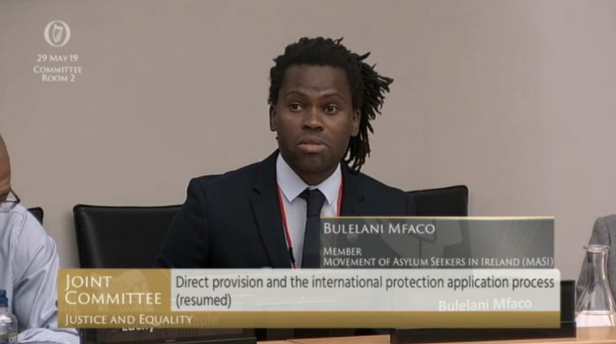A CLARE-based migrants’ rights activist has given a broad welcome to a ground-breaking new report which recommends that the Direct Provision system should end by 2021.
A publication compiled by an expert advisory panel working under the stewardship of Dr Catherine Day will now inform a White Paper being put together on the issue of accommodating those seeking asylum in Ireland.
Bulelani Mfaco lives at the State-owned Knockalisheen direct provision centre, and is a prominent member of the Movement of Asylum Seekers of Ireland (MASI). The South African was also a member of Dr Day’s expert advisory committee.
While MASI, who made a detailed submission last year to the committee, welcomed recommendations on the provision of housing, healthcare, and welfare payments to asylum seekers who do not stay in reception centres, it highlighted areas that continued to be of concern.
Mr Mfaco noted that asylum seekers would continue to be open to discrimination under the Housing Assistance Payment (HAP). In a statement, MASI outlined that, “while the HAP scheme has been the main way out of Direct Provision for thousands of asylum seekers who have permission to live in Ireland, HAP users in general experience discrimination when approaching letting agents/landlords”.
MASI also welcomed a six-month statutory timeframe for processing asylum claims, but flagged concerns in cases where the State fails to meet that deadline.
It called on the State to allow any asylum applicant who has not received a final decision on their asylum claim within 18 months to be allowed to remain in Ireland, saying that would . end the legal limbo facing many face.
“The alternative to Direct Provision must truly mark a departure from the horrors of the past two decades,” Mr Mfaco said. “This must be reflected in the White Paper that will be published before the end of this year to set out a new policy on reception conditions for asylum seekers in Ireland.”
In its concluding remarks in a statement on the Day Report, MASI said that it had “given the formative ideas of how the future of Ireland’s asylum reception system should look”. “Untangling an institution such as Direct Provision is unsurprisingly complex,” it said. “It is evident from the report that if each of the different parties responsible for providing supports to asylum seekers does not fulfil their obligations, the proposed changes overall will not yield the desired outcome. The process of ending Direct Provision needs a commitment from each cabinet minister who presides over an institution that provides or will provide a service to asylum seekers. Without that commitment, we’ll be back to another expert group in five to ten years’ time producing yet another report on Direct Provision.”


